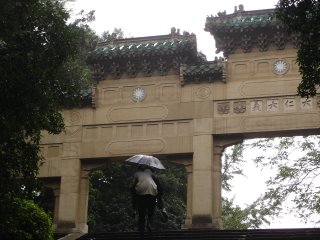One Heart
 Somewhere in China...
Somewhere in China...I am afraid that 2 weeks are not enough time to realize the way people in a society behave around a given state security net of strategies. Less if you take into account the lack of language proficiency. However, by contrast, in order to follow the suggestion, I would dare to assert my first impression.
One of the principal tasks of any society is to guarantee that in its territory, between its people, a basic set of rules to be abided so, then, the members can coexist in a territory. Note that the word “society” could be replaced by “state” or “empire”, but it is placed in this way to address communities regardless the time and the scale. This concept is the same for both security paradigms. One of those principles is concerned with robbery, from which I would like to start.
Before going to China, some Chinese friends told us – my two friends and me - to be aware of thieves and keep always my belongings with me. Several signs present wherever I went remind me too. A common person would soon become paranoid but, because we come from a country where you hear that often, I relaxed and analyzed the situation. As huge hordes of people are expected to crowd every place you go, you also expect the police to be omnipresent, full armored, ready for any suspicious act. Well, there were policemen, just in their place, very kind and ready to help – even foreigners with no knowledge of Chinese –, but not in a number able to control the amount of people in public spaces, amount not very different to those in Japan.
Of course, there was nothing to be protected from. In the whole trip I did not presence any robbery, no other backpacker told us about it, no feeling of menace. Although life conditions where obviously worst than Japan, somehow similar to the ones in my country, this fact was kind of revelatory. My uninformed conclusion is that China and Japan must share a past of strong punishment – mainly physical - to crime, from which society evolved to know respect to those minimum overt pacts. I am interested about this point because I would like to work out some reasons why this problem has not been overcome in Latin America.
Conversely, bodies seem not to be so subjugated in today’s China. Here and there couples holding hands, hugging, kissing, people talks in a very lively and loudly way, horns and bells flood the streets, buyers and sellers openly bargain over merchandises, movement and growth everywhere. In the same direction, public facilities that because of the amount of people could not “properly” work in a country do not do it in China. For example, no rows to take the bus in the stations, once the bus stops a little struggle is common; no way to stop the spitting habit even in close spaces (although I have nothing against that, I think it could be a public health concern); to check all the tickets to get on a train is not an easy task so not only one step, but several controls are required. May all these be a symptom of the possible age of the society? Chaos in China feels like potency. Although I know nothing about people control over policies in the PRC, the sensation makes me feel optimistic about their future and the changes a vertiginously growing society need to achieve.
Reading me, I find that the point about political control could be actually the issue of interest to this blog’s readers, so I want to apologize. Do they act freely while accommodating into the system? Or do they make the system? History of the
OAGS
P.S. One final point I cannot leave behind. In China, the all-mighty-god-like customer culture does not exist. At the beginning, it felt kind of tough but then it started to feel normal, kind of natural. Why should someone get on his/her knees to serve me food in a restaurant? This is the half part of the “we are all equal” statement I agree with. The other half would be “we are all different”.
